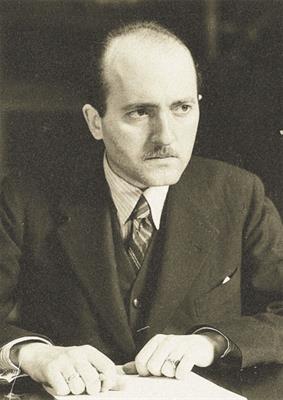Univ.-Prof. Dr. August Maria Knoll

Personalia
Born:
Died:
Profession:
Persecution:
Dismissed in 1938, banned from his profession in 1938, resistance fighter (undiscovered)
Memberships
Curriculum Vitae
The Viennese August Maria Knoll experienced his childhood and youth in the declining Austro-Hungarian Monarchy. After graduating from secondary school, he studied political science at the University of Vienna with the School Brothers. His encounter with the Catholic social reformer Anton Orel [1881-1959], whose Christian Young Workers' Movement he joined in 1919 and where he was introduced to the ideas of Karl von Vogelsang [1818-1890], the most important Catholic social reformer of the 19th century, set the course for his later career. In the same year, he joined the student fraternity Thuiskonia Wien and in 1920 the student fraternity Nibelungia.
In 1923, August Maria Knoll received his doctorate with the dissertation "Karl Freiherr von Vogelsang als Nachfahre der Romantik" (Karl Freiherr von Vogelsang as a descendant of Romanticism). Together with the Nibelungs Ernst Karl Winter, Alfred Missong, Wilhelm Schmid and Hans Karl Frhr. Zeßner von Spitzenberg, he is involved in the founding of "Österreichische Aktion" in 1926. In 1932, he was Ignaz Seipel's private secretary in the last year of his life.
After his habilitation in the sociology of religion in 1933, "Der Zins in der Scholastik", he began teaching as a full professor of sociology at the University of Vienna. He places himself entirely at the service of social reorganization. As editor-in-chief of the "Wiener Arbeiterpresse" at Vorwärts-Verlag and as a member of various socio-political working groups.
In 1938, he was expelled from the university immediately after the Anschluss and banned from teaching. He and his family eked out a meagre existence, supported by ecclesiastical and aristocratic patrons. Together with Ferdinand Habl and Josef Müller-Fembeck, among others, he participates in the Austrian resistance movement, the so-called "resistance hospital", where he produces forged x-rays and helps to issue certificates of incapacity for military service. He also maintained lively contact with military resistance circles and the Karl Gruber group, which had set up a secret radio station in the Hungarian Guard.
From a young age, he struggled to combine religious ideas with social concerns and said of himself: "Even at grammar school, the social question was a concept and experience for me. The first impulses came from Bebel and Marx. Their anti-religious affect choked me, as did the anti-revolutionary affect in Christian-social and church circles."
After the war, he was able to resume his teaching activities, becoming an associate university professor in 1946 and the first full professor of sociology at the University of Vienna in 1950.
Places
Residence:
Citations
Fritz, Herbert/Krause, Peter (2013): Farbe tragen, Farbe bekennen 1938–45. Katholisch Korporierte in Widerstand und Verfolgung. (ÖVfStg, 2013) S. 373.
